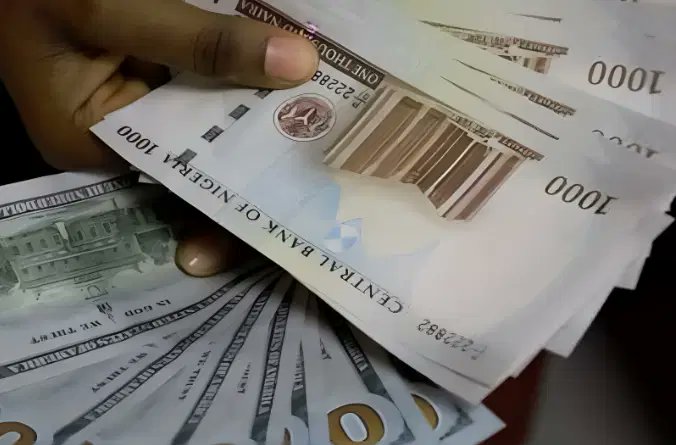
JUST IN: Naira Plunges to N1,629 per Dollar in Official Market, Sparking Economic Concerns

In a significant and deeply worrying turn of events, the Nigerian naira on Monday suffered a sharp depreciation in the official foreign exchange market, falling to N1,629.67 per dollar. This marks one of the lowest points in the history of Nigeria’s national currency, signaling renewed instability in the country’s financial ecosystem and raising critical questions about the direction of economic policies under the current administration.
Data obtained from the Nigerian Autonomous Foreign Exchange Market (NAFEM) indicates that the naira depreciated by N14.27 compared to its previous rate of N1,615.40 recorded last Friday. Market watchers and analysts have described the decline as a reflection of growing demand pressures on the dollar amid limited supply and ongoing challenges in attracting sufficient forex inflows into the country.
According to figures from the FMDQ Exchange, which oversees the official FX trading platform, Monday's trading saw the intraday high reach an alarming N1,670 per dollar, while the lowest point hovered around N1,335 per dollar. The wide spread between the highest and lowest rates underlines the volatility that has gripped Nigeria's forex market in recent months. The total turnover at the close of trading was pegged at $133.65 million, indicating relatively moderate activity but insufficient to stabilize the market.
The fresh depreciation comes just days after the Central Bank of Nigeria (CBN) released a flurry of circulars aimed at regulating Bureau De Change (BDC) operations, enforcing stricter anti-money laundering practices, and introducing operational guidelines for the industry. Although these reforms were widely praised by financial experts as steps in the right direction, they seem to have had little immediate effect in calming the turbulent waters of the forex market.
Investors and business owners are increasingly worried about the impact of the falling naira on the cost of goods, inflation, and overall purchasing power. Nigeria, being heavily import-dependent for consumer goods, raw materials, and industrial inputs, remains vulnerable to external shocks. With the current exchange rate, the cost of importing essential items such as fuel, food products, and machinery will rise significantly, further exacerbating inflationary pressures already felt nationwide.
The parallel market, often referred to as the black market, has also mirrored the trend in the official window, although with higher rates that often widen the arbitrage gap. Reports suggest that the dollar is currently being exchanged for as high as N1,650–N1,700 in some parts of Lagos and Abuja, leaving citizens and small-scale businesses scrambling to cope with the reality of a weakening currency.
The government has continued to maintain its stance that market forces should determine the exchange rate, a move that aligns with President Bola Tinubu’s economic reform agenda. Since the unification of the multiple exchange rates in June 2023, the naira has experienced increased volatility, but officials argue that the policy is necessary to attract foreign investment and build investor confidence.
However, the latest developments have reignited debate over the effectiveness of these market-driven policies. Some critics argue that without adequate foreign exchange reserves, strong capital inflows, and clear fiscal discipline, floating the naira freely leaves the economy vulnerable to speculative attacks and capital flight.
The dwindling reserves of the CBN, combined with falling oil revenues—Nigeria’s main foreign exchange earner—are further complicating the situation. As of March 2025, foreign reserves were reported to be just above $33 billion, a figure analysts say is not strong enough to support robust interventions in the forex market or sustain external obligations over a long period.
Meanwhile, manufacturers, importers, and even educational institutions relying on foreign currency for payments are facing growing uncertainties. For many businesses, the falling value of the naira means ballooning costs of production and operational challenges that could result in layoffs, downsizing, or outright closure. For students studying abroad or those hoping to secure admission, the cost of tuition and living expenses in foreign currency has now become a nightmare.
Ordinary Nigerians are also feeling the pinch in their daily lives. The prices of imported goods, including pharmaceuticals, electronics, and foodstuffs, have skyrocketed in the last few weeks. Even local goods have not been spared, as traders adjust prices to match inflationary trends and the rising cost of raw materials. Transport fares, school fees, and rent have surged, leaving households struggling to meet basic needs.
In response to the turmoil, some economists are calling on the federal government to revisit its forex policies and provide more targeted support to critical sectors of the economy. Suggestions include the revival of export-driven strategies, aggressive pursuit of foreign direct investment, and the tightening of public expenditure to reduce reliance on foreign goods.
Furthermore, there is growing pressure on the CBN to resume timely interventions in the market to prevent further erosion of confidence and ensure liquidity, especially for businesses and institutions with urgent forex requirements. While the apex bank has repeatedly assured the public of its commitment to stabilizing the naira, the current realities suggest a need for more proactive and transparent communication with stakeholders.
With the naira continuing its downward spiral, Nigeria stands at a crossroads. The choices made in the coming weeks—by policymakers, financial regulators, and economic leaders—will determine not only the future of the local currency but the stability of the nation’s economy as a whole.
For now, Nigerians can only brace themselves as the effects of the currency depreciation ripple through every sector, reminding the country of the urgent need for structural reforms, sustainable economic diversification, and sound financial management to secure a more stable and prosperous future.


